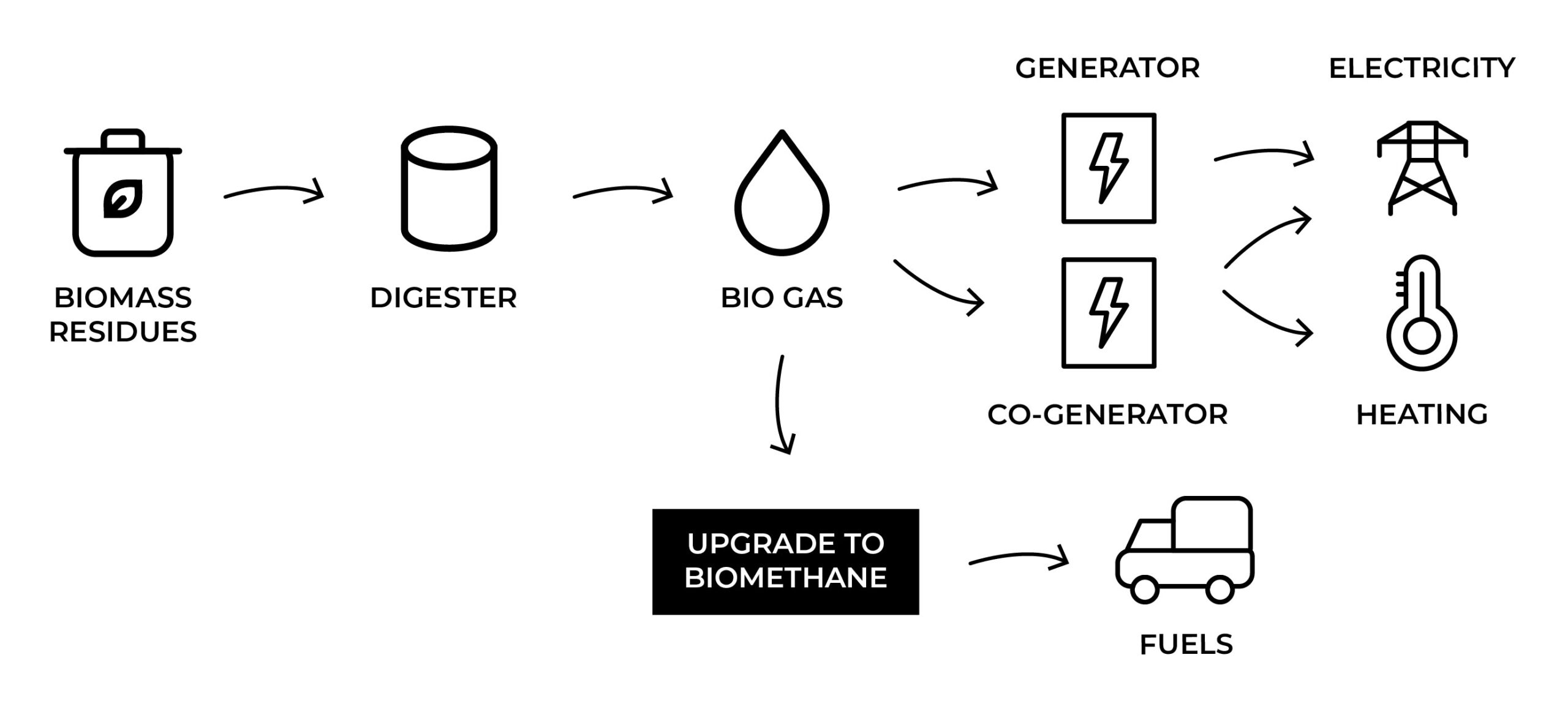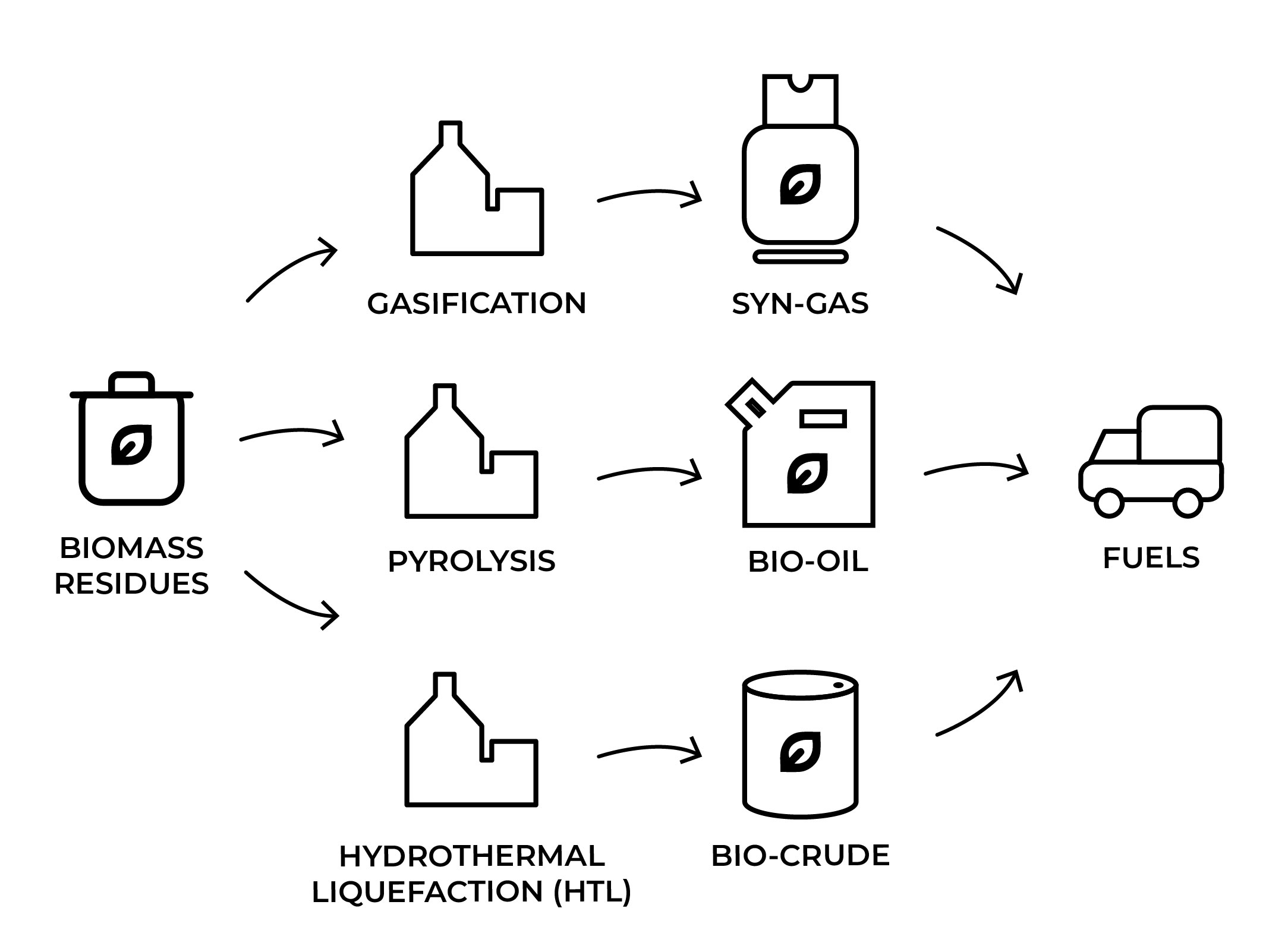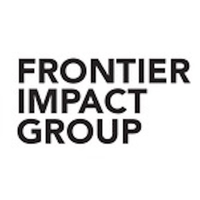Here are your bioenergy options:

Renewable Developments Australia (RDA) is developing a fully integrated biofuel facility near the township of Charters Towers in North Queensland, Australia. The Project involves the development of a fully integrated sugarcane farming, processing and ethanol distillation facility. The Pentland Bioenergy Project is fully integrated with feedstock grown on-site and controlled within the project. Investors will have full control and visibility over the cost and quality of feedstock, materially improving investment performance and economics when compared to traditional operations. The Australian Renewable Energy Agency (ARENA) have provided a $3 million grant to RDA to support progression of the project to Financial Close. 28,500 hectares of high yield agricultural land approximately 50 km south-west of Charters Towers has been secured via a long-term lease for Stage 1 development. Further expansion is possible post Stage 1 with the option for second generation ethanol production and additional contiguous land secured for future stages of development. The Project intends to Extract the full value of the sugarcane’s potential, with annual production estimated to include:- Approximately 190 million litres of high grade bioethanol from first generation processing. – Approximately 700 kilo tonnes of bagasse, a by-product of the diffusion and Extraction process, used to power a 16 megawatt cogeneration plant located on site, generating valuable Large-scale Generation Certificates for sale.
http://rdaust.com/pentland-bioenergy-project.html
Check the Biomass Producer Website for more Bioenergy case studies.

The Ecotech Biodiesel production plant is located 35 kilometres north of Brisbane in Queensland, Australia. The facility can produce up to 30 million litres with room for a second facility to increase production to 75 million litres. The facility has been in operation since May 2006.
https://www.ecotechbiodiesel.com/biodiesel
Check the Biomass Producer Website for more Bioenergy case studies.
Anaerobic Digestion + Biogas Upgradingi

Muradel is an advanced biocrude-oil production company based in Australia that utilises sustainable and renewable organic based feedstocks as a direct replacement for non-sustainable oils such as mineral crude oils and palm plantation oils. Muradel has developed a technology platform, known as Green2Black™, that can be integrated into existing wastewater treatment plants to sustainably manage sludges and biosolids. Muradel aims to provide technological solutions for sludge/biosolids management, producing marketable products including biocrude oil for the international biofuels market. The biocrude oils produced by Muradel can be fractionated into a spectrum of fuel products and petrochemicals analogous to those produced from a barrel of fossil crude, and the oleochemicals. Muradel biocrude oils are energy positive and have a reduced carbon footprint compared with traditional crude oils.
https://muradel.com.au/
Check the Biomass Producer Website for more Bioenergy case studies.

The Northern Oil Advanced Biofuels Pilot Plant is an $18 million green fuel game changer being developed by Southern Oil Refining at its Northern Oil Refinery at Yarwun, near Gladstone, Queensland. The pilot plant, opened in June 2017, is using biomass material such as sugarcane bagasse and prickly acacia as feedstock for the production of bio crude oil, which will be refined into saleable kerosene and diesel products. Within three years of opening, the pilot plant aims to have produced one million litres of fuel for use in field trials by the US navy as part of its Great Green Fleet initiative, by the Australian Defence Force, by Australian heavy road transport operators and possibly for the aviation sector.
Licella’s proprietary ‘catalytic hydrothermal’ technology uses water, pressure and heat to convert biomass to bio-crude oil. The biomass is made into slurry, continuously pressurised, heated, reacted and then cooled to create the bio-crude oil. The process can convert a range of feedstocks. Licella has tested wood products (eucalypt, Pinus radiata), agricultural residue (bagasse, wheat straw), grasses and algae. Unlike techniques such as pyrolysis, hydrothermal upgrading with Licella’s Cat-HTR™ platform produces a stable biocrude which can be easily shipped, is not acidic and is miscible (blendable) with conventional oil. The pilot plant, located at Somersby, north of Sydney, demonstrates the continuous-flow process from slurry preparation, pressurisation, heating and reacting through to cooling and final separation of the bio-crude oil. Heavily automated, partly for safety reasons, the pilot plant has the capacity to process 10,000 tonnes of slurried biomass per year. Supported by government funding of $5.4 million from ARENA, Licella is developing a de-risked feasibility study for a commercial plant that can handle 400,000 green tonnes of wood. The study includes selecting the plant location and the type of biomass, and signing up agreements with biomass suppliers and bio-crude buyers, essentially de-risking the business case for potential investors.
Northern Oil Advanced Biofuels Power Plant
Licella – A bridge to a lower carbon future
Check the Biomass Producer Website for more Bioenergy case studies.

When the pyrethrum plant is processed for its natural insecticide (the chemical pyrethrin), the leftover parts of the plant are turned into briquettes, able to be burned as a biofuel. Meat processor Greenham Tasmania is burning pyrethrum briquettes to power the main steam boiler at its Smithton export abattoir, accounting for up to 30 per cent of its energy demands. The transition involved a $1.3m investment and several years of refinement.
https://www.botanicalresources.com/our-pyrethrins/sustainability
Check the Biomass Producer Website for more Bioenergy case studies.

Cape Byron Power, operated by Cape Byron Management, consists of two 30 MW biomass fired power stations, on the NSW north coast. Together, these form one of the largest renewable base load generators in Australia. The electricity is predominantly produced from sugar cane milling waste, along with certain types of wood residues and energy crops, commonly referred to as ‘biomass’ fuel. Cape Byron Management, led by a highly experienced board of directors and management team, is at the forefront of sustainable biomass practices and has a commitment to continuous improvement and innovation; driving fuel procurement according to defined principles of best practice benchmarks. Cape Byron Management Team are leaders in responsible and sustainable biomass power generation providing carbon neutral, cost effective and reliable renewable power now, and into the future. Cape Byron Management uses sustainably sourced biomass fuels which are low carbon, cost effective and renewable.
https://www.capebyronpower.com/
Check the Biomass Producer Website for more Bioenergy case studies.

JBS Australia, the country’s largest meat processor and exporter, is capturing and using biogas at its Dinmore, Queensland facility to reduce dependence on grid-connected natural gas by about 50 per cent. CEFC strategic alliance partner Wiley constructed and designed the biogas and water treatment plant and earned the Queensland Master Builders Association award for Innovation in Environmental Management Construction for its work with JBS. JBS Australia employs about 2,000 staff at its Dinmore processing facility where it installed new pre-treatment equipment and covered anaerobic lagoons to capture the biogas generated at the site. The facility has reduced its carbon emissions by 89 per cent and is saving more than $1 million a year on natural gas costs.
http://www.wiley.com.au/projects/biogas-recovery-project-gives-jbs-environmental-and-financial-edge/
Check the Biomass Producer Website for more Bioenergy case studies.

The Drysdale Landfill Biogas Renewable Energy Facility (REF) is located at the Drysdale landfill which is the principal landfill for Geelong. The landfiill site takes in approximately 90,000 tonnes of mixed solid waste per annum. The REF collects the biogas generated from the contaminated organic portion of the waste stream and uses it to generate baseload, renewable electricity. The facility generates 8500MW’s of renewable energy per year, which is enough to power over 1,500 homes.
https://www.lms.com.au/projects
Check the Biomass Producer Website for more Bioenergy case studies.

Starting mid-2022, the East Rockingham WtEs will convert 300,000 tonnes per year of residual waste from non-recyclable materials in the Perth metropolitan area to deliver baseload electricity, recycle aggregate and metals ,and divert 96% residual waste from landfill.
Check the Biomass Producer Website for more Bioenergy case studies.

Australian Paper (AP) is proposing to develop a 225 megawatt thermal Energy from Waste (EfW) plant adjacent to the existing AP Maryvale Pulp and Paper Mill site on land owned by AP in the Latrobe Valley, Victoria. The aim of the proposed $600m EfW plant is to allow AP to attain a sustainable, long-term and stable alternative base load energy source to provide steam and electricity for the existing Maryvale Mill, which has been manufacturing paper since 1938. For this 225MWth EfW plant the operating waste feed requirement is estimated to be 650,000 tonnes per annum (tpa) of non-hazardous residual waste which would otherwise be sent to landfill. It is proposed to use Municipal Solid Waste (MSW) for approximately 80% of the fuel input to the EfW plant. MSW is waste from household rubbish collections (not recyclable collections). Some Commercial and Industrial (C&I) waste (approx. 20% of fuel input) would also be used, with the non-hazardous C&I waste being similar to MSW, but sourced mostly from manufacturing facilities, shopping centres and office buildings.
https://www.australianpaper.com.au/about-us/creating-energy-from-waste/
Check the Biomass Producer Website for more Bioenergy case studies.
Do you need assistance?
Our consultants can help with your next bioenergy project! Click the arrow for contact details








